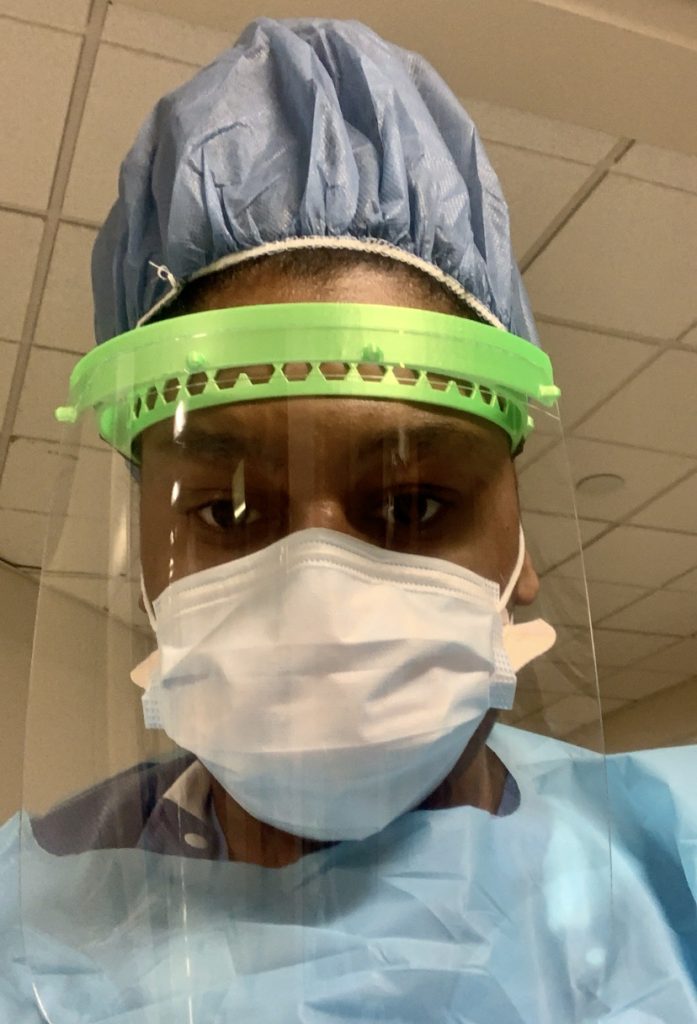NASHVILLE, Tenn. (TSU News Service) – Keisha Coleman is finally home for a well-deserved rest. For three months straight and working 13-hour shifts, the traveling nurse and Tennessee State University graduate was on the front line caring for COVID-19 patients in New York.

“I love my patients and I miss them but I was excited to come home,” says Coleman, a critical care nurse who worked in the intensive care units at several hospitals in New York.
“I didn’t want to leave them, but I was ready to come home just to see my family because they were home worried for me as well. My mom couldn’t sleep, she would text me late nights on the job to see if I am okay.”
Coleman always wanted to work in critical care and she says TSU prepared her well for the challenge. After earning her associate’s degree in nursing in 2017, she worked at Nashville General Hospital and St. Thomas Midtown Hospital in the Intensive Care Unit. After some time at St. Thomas, Coleman says she decided to be a traveling nurse, “and just then, COVID came.” Her first assignment was New York, one of the country’s hardest hit states.
“It was tough and scary at first, but I do think TSU prepared me well to be the nurse and strong woman I am,” says Coleman. “At some point of my assignment, instead of the usual two, I had four to five critical patients, who were sedated, on ventilators and paralyzed. It was scary when you have all of these critical patients you have to take care of. You get to thinking about yourself, your health. Some nurses got infected. I can honestly say I was nervous about contracting the virus, but I came back home and I tested negative.”

Like many healthcare workers on the front line in the early days of the pandemic, Coleman says the task was daunting – long hours, influx of patients and shortage of critically needed PPE’s, or personal protective equipment.
“From day one we were limited on PPEs that were needed to go in the rooms to take care of patients,” says Coleman. “When I got there, we had all COVID patients. When we gowned up, we had to go to multiple rooms with that one gown. Normally, we would take off that gown prior to leaving the room. Since we were so limited, we had to use the same gown in different patients’ rooms. It was so bad that at some points we had to use bleach to wipe down our gowns to reuse them. We were limited on gloves, masks and certain medications.”
Amid the shortage, Coleman says the patient load continued to climb, as hospitals ran out of space for patients and places to store the mounting number of dead people.
“After a lot of those patients died we didn’t have any rooms,” recalls Coleman. “We were putting them on the roof, in the basement and some in a tractor trailer outside. As all three places were full, we started putting bodies on a sled and just dump ice on them,” she says.
By the end of May, Coleman says things started to slow down. Some patients who had been admitted for up to three months began to get better – being able to walk, learn to talk, and breathe on their own.
“It was a good feeling,” she says. “I didn’t want to leave them, but I was ready to come home. But I am glad I went. It really was a humbling and rewarding experience. It is good to have this experience firsthand to tell my future children, and that I was on the front line helping.”
While Coleman’s situation was dire, she is one of several TSU nursing school graduates among the thousands of healthcare workers around the country responding to the influx of patients suffering from COVID-19. They’re conducting screenings, communicating to patients’ families, and above all, caring for the critically ill.
Dr. Pinky Noble-Britton, associate professor and director of TSU’s BSN program, says like Coleman, TSU nursing students are prepared to perform at the highest level of their profession in administering safe patient care.
“We push them and they are expected to use whatever resources they have to their best ability,” says Noble-Britton.
Knowing that her work is critical, especially with the new surge in coronavirus cases across the country, Coleman says she plans to take another month off and then head back to helping COVID patients.
“I plan to go back and help in one of the other states, like Florida, Texas or Arizona, which are epic centers,” says Coleman. “My plan is to travel and change lives, and just to know that I made a difference.”
Coleman also plans to return to TSU to earn her BSN degree. The program is now accepting applications for Fall 2020. The Traditional B.S.N. at TSU provides an instructional environment that teaches students how to provide holistic, ethical and culturally sensitive care to clients across the lifespan. To learn more about TSU’s nursing program, visit http://www.tnstate.edu/nursing/
Department of Media Relations
Tennessee State University
3500 John Merritt Boulevard
Nashville, Tennessee 37209
615.963.5331
About Tennessee State UniversityFounded in 1912, Tennessee State University is Nashville’s only public university, and is a premier, historically black university and land-grant institution offering 39 bachelor’s degree programs, 24 master’s degree programs, and seven doctoral degrees. TSU is a comprehensive research intensive institution with a R-2 Carnegie designation, and has a graduate school on its downtown Avon Williams Campus, along with the Otis Floyd Nursery Research Center in McMinnville, Tennessee. With a commitment to excellence, Tennessee State University provides students with a quality education in a nurturing and innovative environment that prepares them as alumni to be global leaders in every facet of society. Visit the University online at tnstate.edu.
